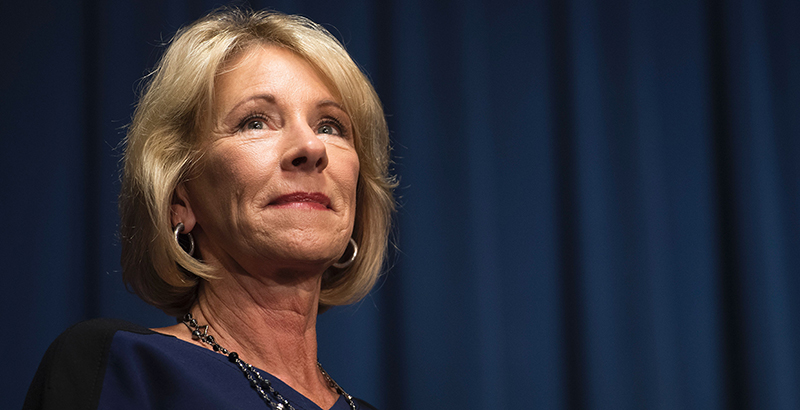Government Watchdog: Congress Should Require More Info on Special Ed Rights in Transition to Private School

Congress should consider requiring states to inform parents about changes in the rights of students with disabilities as they move from public to private schools, a government watchdog agency said.
“As more than half of the current private school choice programs are designed specifically for students with disabilities, it is critical that parents have access to quality information about changes in special education rights when they are considering moving their child from public to private school,” the Government Accountability Office wrote. Three Democratic members of the House had requested the report, which was made public Nov. 30.
The agency studied 27 voucher and education savings account programs in 14 states and the District of Columbia, enrolling 181,624 students. In addition to studying the programs’ provisions for students with special needs, researchers looked at the academic, administrative, and financial accountability provisions choice programs must follow.
Among the 27 programs studied, nine didn’t provide any information about changes in special education rights. The report didn’t specify which programs did not provide information about special education rights and did not identify any individual schools by name.
Four of 15 programs specifically designed for students with disabilities didn’t including information about changes in rights under the federal Individuals with Disabilities Education Act. Those four programs enrolled nearly three quarters of children participating in private choice programs for students with disabilities. Another five programs for students with disabilities contained inaccurate information, according to the GAO report.
Parents who choose to enroll special needs students in private schools give up many of the rights they’re afforded under federal law if they stay in public schools, including a guarantee of a free, appropriate public education; access to the “least restrictive environment” that seeks to include special needs students in mainstream classes as much as possible; protections against some discipline practices; and due process rights to appeal through the courts if a student’s needs aren’t being met.
Federal law and Education Department regulations do not require that parents be told about the changes when moving from a public to private school.
The applicability of federal civil rights laws, particularly protections for students with disabilities, has been a source of constant tension between now–Education Secretary Betsy DeVos and congressional Democrats since her confirmation.
During her politically damaging confirmation hearing, she said it was a matter better left to states. This spring, the Trump administration proposed a pilot voucher program, and DeVos sparred with appropriations committees in both chambers over whether such a program would include civil rights protections for different groups of students, including those with disabilities.
She did say that private schools accepting federal money would have to comply with federal law.
“I said it before, and I’ll say it again, that schools that receive federal funds must follow federal law,” DeVos reiterated.
GAO investigators also interviewed stakeholder groups, some of whom said parents believe that because the programs are state-funded, children will have similar protections to those granted under IDEA to public school students. Others said that parents believe that because private schools request copies of their child’s IEPs (Individual Education Plans), those services will continue.
Parents of students with disabilities seeking private school options may have difficulty even finding an appropriate program, the GAO found: no more than half of schools participating in all private choice programs, and no more than 53 percent of schools in special-needs-specific programs, mention students with disabilities anywhere on their website.
No more than 21 percent of websites for schools in special-needs-specific programs provided information on which types of disabilities the school serves, whether it serves exclusively students with disabilities, and whether teachers are trained to serve students with disabilities, the GAO found.
The website reviews were limited to a representative sample of schools participating in the 23 voucher programs operating in January 2017; researchers said they couldn’t determine the universe of schools participating in the four ESA programs.
Some parents choose private options because they feel public schools aren’t meeting their children’s needs. About 1 percent of the 6.6 million students covered by the Individuals with Disabilities Education Act were placed by their parents in private schools in the 2014–15 year, according to federal data, and another 3 percent were in special schools, either private or public, specifically for children with disabilities.
The Education Department, in its formal response to the GAO’s report, said there is not a conflict between ensuring that rights under IDEA are protected and offering choices to families.
“Offering parents of students with disabilities the opportunity to choose among a private school, a different public school, or a non-public school through a State-operated voucher Education Savings Account program empowers the parents to ensure their children receive educational services that work best for their child,” Kimberly Richey, acting assistant secretary for special education, wrote.
Parents dissatisfied with private options may re-enroll in public schools, where they retain all their rights, she added.
Among the report’s other findings:
- Most programs, 18 of 27, required participating schools to administer tests.
- Nearly all programs required participating schools to meet some sort of administrative requirement, like health and safety standards (25 programs), teacher qualifications (19 programs), or staff background checks (17 programs).
- Financial accountability requirements were less common, with 15 programs mandating that schools demonstrate proof of financial soundness and eight requiring an annual audit of schools.
Get stories like these delivered straight to your inbox. Sign up for The 74 Newsletter

;)
